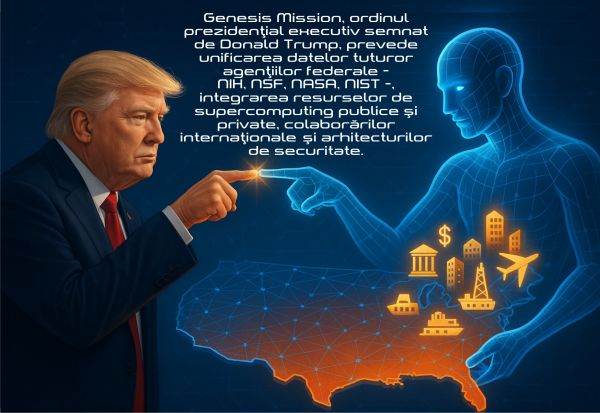Genesis Mission, this is the name of the presidential executive order signed on November 24 by President Donald Trump, which established the plan for the total reorganization of American science under the leadership of Artificial Intelligence (AI).
According to official documents posted on the website of the American Presidential Administration, the Genesis Mission would become the largest coordinated scientific effort in modern history of the United States, comparable to the Manhattan Project and the Apollo Program. The White House website describes this program as a "total mobilization” of supercomputers in national laboratories, data sets accumulated over decades of federal investment, universities, private companies and the entire scientific infrastructure. All integrated into a centralized AI mega-platform, called the "American Science and Security Platform”, designed to train fundamental scientific models, create AI agents capable of formulating hypotheses, designing experiments, running autonomous simulations and accelerating scientific discovery at an unimaginable speed.
The platform, in the White House's vision, will become the "digital heart” of American science. It will integrate HPC supercomputing, secure cloud, simulation tools, predictive models, laboratory robots, autonomous production lines. It will provide access to proprietary, open, classified, synthetic federal data sets. It will include AI systems capable of navigating complex design spaces, identifying new molecular structures, generating predictions for advanced materials, optimizing industrial processes. It also wants to transform research so that experiments can be designed by AI, run by robots, analyzed by AI, adjusted by AI and even published with AI support.
The cited documents also announce that the Genesis Mission will trigger a revolution: acceleration of medical research, acceleration of nuclear fusion, rapid discoveries in biotechnology, solutions for critical materials, advances in semiconductors, progress in quantum science, solutions for energy, radical innovations in engineering. All through AI, integrated into a single, centralized system.
Furthermore, the presidential order establishes that in the next 90 days an inventory of supercomputers will take place, in 120 days for the unification of data sets, in a maximum of 240 days the robotic laboratories will be evaluated, and at the end of 270 days the first presentation of the results obtained will take place.
After the publication of the presidential order, Reuters, The Washington Post, AP News, Politico and The Independent began to analyze the project. The criticism quickly took shape in a few clear axes.
The first criticism refers to the lack of real funding. The Genesis Mission project is colossal in its ambition, but the presidential order does not contain any major additional financial allocation. Experts consulted by the cited sources say that the Trump Administration wants to do world-class science with aging infrastructure, insufficient grants, and underfunded institutions. Critics argue that, instead of investing in universities, laboratories, and people, President Donald Trump is proposing an AI megasystem that, in theory, would compensate for all the shortcomings, but in reality will mask them.
The second criticism concerns excessive centralization. Genesis Mission requires the DOE to unify data from all federal agencies - NIH, NSF, NASA, NIST - and to integrate public and private supercomputing resources, international collaborations, and security architectures. A single AI platform, a single access point, a single decision center. An infrastructure that can quickly become political, influential, vulnerable to abuse, and difficult to audit, claim IT experts and representatives of civil society, according to the American press.
The third criticism concerns the risks to democracy and transparency. Several articles from the cited sources point out that this platform could eventually become a research control system. If all data passes through a single gateway and access is centralized, decisions about which studies receive resources can become implicitly political. And if modeling, analysis, and experiments are automated, who checks AI decisions? Who is responsible for errors? Who controls bias? Who checks institutions that manage sensitive data?
The fourth criticism brings energy costs to the forefront. Experts reiterate that AI data centers consume enormous amounts of energy. In the context of the strained American energy grid, a program of the size of the Genesis Mission will massively increase energy demand. The bitter irony is that the program is promoted as the solution to the energy of the future, but it may put increasing pressure on the current infrastructure , generating problems before providing solutions, say US energy experts.
The latest criticism brings into question the fact that, unlike the Apollo Project, the Genesis Mission does not come with clear, measurable, physical objectives, such as an equivalent of a "man on the moon”. Everything is nebulous, abstract, based on hopes related to how AI will develop. Official documents promise accelerations, epochal leaps, paradigm shifts, but without clear deadlines, without quantifiable milestones, without detailed explanations.
While the White House talks about a glorious digital future, American universities are facing structural difficulties: insufficient funding, reduced grants, underfunded laboratories. Researchers fear that the Genesis Mission is becoming a political front to hide the fact that America's scientific infrastructure needs real investments, not just algorithms that work wonders.
These tensions are amplified by comparisons with the AI policy of the previous administration. Donald Trump has already signed orders against "woke AI,” liberalized the export of AI technologies, reversed Biden-era AI safety policies, launched America's AI Action Plan, and is promising an era of American technological dominance. The Genesis Mission is the pinnacle of this strategy, an instrument of global power. But when the instrument becomes more powerful than the people who use it, who controls it, and what does it control?
On paper, the Genesis Mission is fascinating, but critics say it is in reality just the most ambitious attempt at a scientific rebranding of Artificial Intelligence.
The question remains: will the Genesis Mission be the beginning of a new era? Or will it become an epic of unfulfilled promises and hyperbolic ambitions? One thing is certain: at the end of the next 270 days, the experts who will manage the Genesis Mission must present their first results.
















































